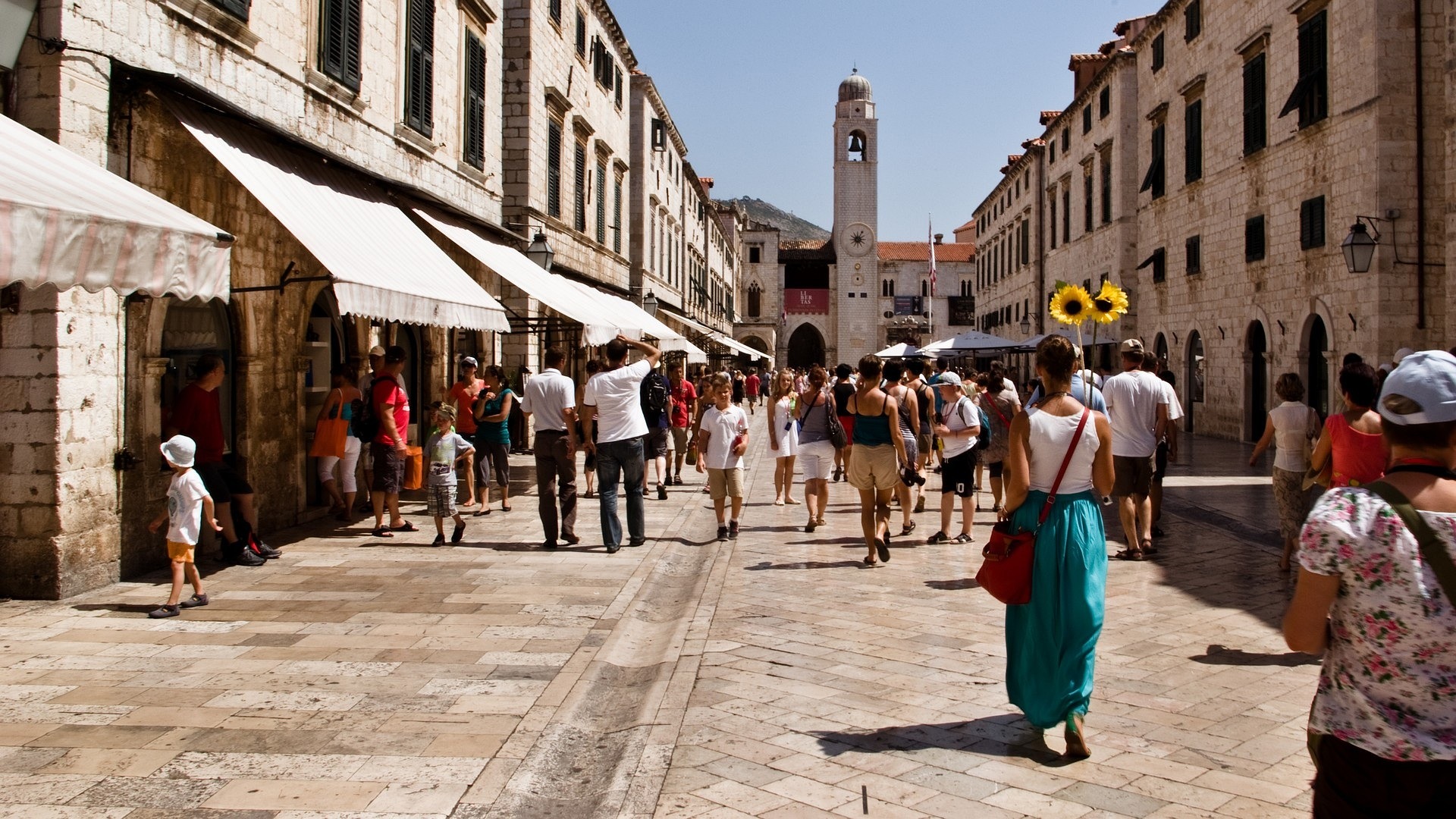Do people speak English in Dubrovnik?
When visiting a new country, it’s natural to wonder if locals will understand you. Can you order food or ask for directions without misunderstandings? If you’re planning a trip to Dubrovnik, you’ll want to know if English is widely spoken. While exploring the historic Old City walls and charming streets is exciting, clear communication enhances the entire experience.
Croatia is renowned for its breathtaking scenery and rich history. Over time, the country has also become proficient in English, reflecting its diverse cultural influences, strong educational system, and thriving tourism industry.
As one of Croatia’s top tourist destinations, Dubrovnik leads in English proficiency. With a multitude of international visitors, many working in hotels, restaurants, and shops speak English fluently. Read on to discover more on do people speak English in Dubrovnik and what to expect upon your arrival in this beautiful city.
Is English widely spoken in Croatia?
Yes, English is widely spoken throughout Croatia, ranking highly in Europe for proficiency. According to the 2024 Education First (EF) study, Croatia ranks 5th globally for English skills, surpassed only by the Netherlands, Singapore, and Sweden. This ‘very high proficiency’ is remarkable for a non-primary English-speaking nation. Croatians often learn English early through exposure to English media like movies, TV shows, and music, typically with subtitles rather than dubbing, aiding in fluency.
In Croatian schools, children start learning a second language around age seven, with English being the most common choice. German and Italian are also popular second languages. Consequently, a significant majority of Croatians aged 15 to 34 are proficient in at least one foreign language, notably English.
English proficiency is strongest in urban centers such as Zagreb and Split, and along the coast, owing to high tourist traffic. In smaller towns and villages, English proficiency may vary, making basic Croatian phrases useful. Overall, however, English is widely spoken, particularly in tourist hubs.
Do people speak English in Dubrovnik in general?
English is widely spoken in Dubrovnik, especially in areas frequented by tourists. The city’s economy heavily relies on tourism, so local businesses are highly motivated to communicate clearly with international visitors.
Hotel receptionists, restaurant servers, baristas, shop assistants, and tour guides typically speak English well. In upscale hotels and restaurants, staff often speak multiple languages fluently, including English, German, and Italian. Even in smaller family-run accommodations or local konobas (traditional taverns), you’ll find that at least one staff member can hold a basic conversation in English.
Younger locals, especially those under 40, tend to speak English fluently thanks to education and exposure to English-language media. Older generations may have more limited vocabulary, but are usually friendly and will make an effort to help.
In everyday situations, like asking for directions, ordering food or buying tickets, you’ll rarely run into a language barrier. If you do, people are generally patient and will try to assist using gestures or even translation apps.
Getting around Dubrovnik using English
You don’t need to worry about getting around Dubrovnik without knowing Croatian, especially within the Old Town and other popular areas like Lapad and Gruž. Here’s a breakdown of what to expect in practical terms:
- Public transport: Dubrovnik’s city buses are operated by Libertas. Most ticket booths and bus stops have English signage. While bus drivers may not be fluent, they usually understand basic route-related questions like “Does this bus go to the Old Town?” or “Which stop for the port?” It’s smart to have your destination written down just in case. Buses are often crowded in summer, so plan ahead.
- Taxis and rideshares: Most taxi drivers in Dubrovnik speak at least basic English. However, using a rideshare app like Bolt or Uber (popular in Croatia) ensures smoother communication, as destinations and payments are handled within the app.
- Restaurants and cafés: Menus are almost always available in English, and waitstaff in tourist areas typically speak it well. In less touristy neighborhoods, menus might be only in Croatian, but servers are usually happy to explain or recommend something in English.
- Tours and excursions: If you’re booking a walking tour of the Old Town, a Game of Thrones experience, a boat trip to Lokrum or the Elaphiti Islands, English will be the default language for most guided activities. Descriptions online and at tour kiosks are usually in multiple languages and operators clearly state which languages are available for each tour.
- Shops and markets: Staff in souvenir shops, boutiques and supermarkets usually speak enough English to assist with prices, products, and basic questions. In local green markets, older vendors may not speak English, but pointing, smiling, and using numbers (or a translation app) works just fine.
- ATMs and payment: ATMs in Dubrovnik have English-language options and credit/debit cards are widely accepted, especially in hotels, restaurants and stores. For small purchases or bus tickets, it’s good to carry some cash (Euros). If prompted at an ATM or card reader, always choose to be charged in Euros, not your home currency, to avoid bad exchange rates.
Connecting with local life in Dubrovnik
While English will get you through any practical situation, a deeper connection with locals comes from understanding a bit more than just the language.
- Basic Croatian phrases can be helpful: A simple “Dobar dan” (Good day), “Hvala” (Thank you), or “Molim” (Please/You’re welcome) can go a long way. Locals genuinely appreciate the effort, even if your pronunciation isn’t perfect. It shows respect and curiosity. Learning how to say “Koliko košta?” (How much is it?) or “Gdje je…” (Where is…) can also be useful.
- Local etiquette: Croatians are generally polite and reserved at first, but warm once you engage. When entering a shop or café, it’s customary to greet with “Dobar dan”. In more personal interactions, eye contact and a firm handshake are common. Small talk is appreciated, especially about food, culture, or sports.
- Going beyond tourist zones: If you go outside the Old Town to neighborhoods like Lapad, Gruž, or even nearby villages like Cavtat, you’ll get a more authentic glimpse of daily life. English may not be as common in smaller bakeries, post offices, or local bus stations, but locals are usually helpful and kind.
- Markets and festivals: Visit local markets or cultural events, that will give you a chance to engage beyond typical tourist interactions. Ask vendors about their products or origins. They might not speak perfect English, but the experience of trying and interacting can be very interesting. If you’re in Dubrovnik during a festival like the Dubrovnik Summer Festival, you’ll often find bilingual programs and friendly staff willing to explain things in English.
English speaking tourists at ease
Now that you know how widely English is spoken in Dubrovnik, you can plan your trip with more confidence. When you’re checking into a hotel, ordering dinner or booking a boat tour, you’ll find that communication is rarely a problem. Most people working in tourism speak English well, and signs, menus and services are often available in English, as well. Getting around the city and handling practical things like transport or shopping is usually straightforward.
Still, making a small effort to learn a few Croatian words can be worthwhile. It’s not essential, but locals often respond warmly when visitors try, even just with a simple “hvala” or “bok.” While English will get you through almost any situation, a bit of curiosity about the local language and culture can lead to more genuine moments and conversations, something that often makes a trip more memorable.
Photography: Pexels







